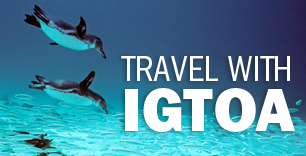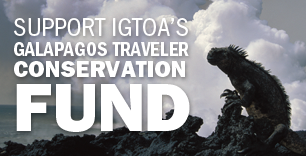Search
Tag Cloud
Subscribe
IGTOA Donates $15,000 to Help Humanely Control Galapagos Pet Populations
This year, IGTOA and its member companies were proud to contribute $80,000 to four organizations working on the front lines of Galapagos conservation. Darwin Animal Doctors (DAD) received a $15,000 grant. The following is a thank you letter from DAD that explains how IGTOA's funds will be used to safeguard and protect the Galapagos Islands in the coming year.
Dear IGTOA Members,
While dogs and cats certainly may be the last animals tourists expect to encounter in the Galapagos, humanely controlling their populations protects the wildlife that visitors travel so far to see. With a combination of disease testing and research, sterilization surgeries, direct veterinary services and community outreach and education, you are helping us save lives today, and creating a more sustainable Galapagos into the future.
While visiting the Galapagos on a marine conservation mission in 2009, we were shocked to discover arctic dogs like Huskies on the islands, and cats on various islands, but little to no veterinary care available. Determined to do something, Darwin Animal Doctors was formed to address this problem. Although we started in 2010 going door-to-door to treat animals, our clinic subsequently grew to providing year-round free veterinary care to all animals, including any wildlife that the National Park bring to the clinic.
While we’ve been able to have the greatest impact in the most populated place, Puerto Ayora, we needed more resources to expand our service area. Thanks to your significant help, we will be able to reach more patients beyond Puerto Ayora with expanded satellite sterilization campaigns into the highlands, and also to other islands in partnership with ABG. For every animal we sterilize, each surgery prevents potentially hundreds of unwanted litters, and their associated wildlife predation. So far, Darwin Animal Doctors has treated over 10,000 animals on the islands.
Along with domestic animals comes invasive diseases. Dogs are susceptible to distemper, parvo and ehrlichia. Because no vaccines are allowed in the Galapagos, running tests for invasive diseases is extremely important to determine the presence of diseases and whether they could potentially transfer to wildlife. We’re fortunate enough to have a very advanced IDEXX laboratory and diagnostic equipment, but we were limited in the number of tests we could perform. With your generous support, we’ll now be able to run many more disease tests, build more data and figure out the most effective means of stopping these invasive diseases.
In addition to shielding wildlife from predators and disease, you’re helping us provide direct veterinary services to wildlife. When the National Park asks, we treat any of the endemic island residents and all for free. Past patients have included an owl, giant land tortoises, lizards, a blue-footed boobie, other birds and even a sea lion.
To create solutions that last, we partnered with ABG on community education events that provide fun and accessible humane education, distribution of free leashes, collars and biodegradable poop bags (a small but important step!). Darwin Animal Doctors vets provide free veterinary training to any interested local residents.
From all of us at Darwin Animal Doctors, we cherish your contribution to saving the extraordinary wildlife of the Galapagos and all of the magnificent, endemic inhabitants. Thanks to your generous and meaningful support, we’ll now be able to save even more animals. And for that, we can’t thank you enough!


.jpg?1566251048)





